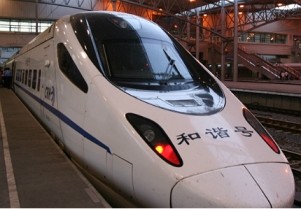The Zhuzhou Electric Locomotive Research Institute (ZELRI) under the CRRC Corp., manufacturer of high-speed rail equipment, has successfully developed the permanent-magnet synchronous electric-machinery traction system, after 10 million test runs, 100 million yuan ($16.1 million), and over 11 years, giving the nation's high-speed rail industry an extra advantage.
The China Economic Weekly reported that the system was delivered on May 16 for use on the trains traveling the no. 1 subway route in Changsha, capital of Hunan Province.
Ding Rongjun, president of ZELRI and a member of the Chinese Academy of Engineering, said that they have designed a 699-kW model for the new system, which is suited for use on a high-speed rail train with speeds of up to 500 km/h. The new system places China in the same category with Germany, Japan and France as one of the few countries having such technology.
Ding said that the permanent-magnet traction system's cutting-edge technology can vastly improve the energy efficiency, power quality, and controllability of trains. As a result, new cars will be more economical, reliable and comfortable.
Research on the advanced traction system was started by ZELRI in 2003 and has overcome several challenges during the development process. After overcoming the overheating problem, it produced technology that can be at par with some leading international rail-equipment manufacturers such as Siemens and Bombardier.
In late 2011, the system was first installed on some trains, on a trial basis, on route no. 2 of the subway in Shenyang, in northeastern China's Liaoning Province. The new equipment worked successfully without malfunctioning for 70,000 kilometers of train travel, as of the end of May 2015.
Supported by the central government, ZELRI started upgrading the wattage of the system from 190 kW for use in a city subway, to 690 kW for a high-speed rail train with speeds of up to 500 km/h in 2011. The upgraded model successfully rolled out in Oct. 2014.
"We expect to adapt the system on the nation's high-speed rail trains in the near future," Li Yifeng, chief designer of ZELRI, said.
Data showed that by substituting the permanent-magnet synchronic traction system with the existing system, the power of the electric machinery of the high-speed rail trains will be enhanced by 60 percent and cut its degeneration by 70 percent.



























